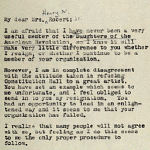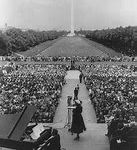This year Easter Sunday (April 4, 2021) is followed by the United Nations International Day of Conscience (April 5th), which reminds me of a story about Eleanor and how an act of conscience lead to an Easter concert.
The year was 1939. FDR was President, and Eleanor was in the White House as First Lady. Segregation and racial injustice were openly and deeply embedded in not only the beliefs and actions of white individuals, but also in the laws and systems of society.
For example, a few years earlier after white patrons had complained about the failure to segregate blacks sufficiently away from whites, the Daughters of the American Revolution (DAR) had enacted a rule that excluded African American artists from performing in their venue, Constitution Hall in Washington D.C. In February of 1939 and acting pursuant to that rule, DAR barred Marian Anderson, a world-renowned African American singer, from performing on their stage.
 Eleanor was a DAR member at that time, but she was not personally associated with either this rule or decision. Even so, guided by her conscience Eleanor injected herself into the situation by condemning the action and resigning in protest, stating in part: “[F]eeling as I do this seems to me the only proper procedure to follow.”
Eleanor was a DAR member at that time, but she was not personally associated with either this rule or decision. Even so, guided by her conscience Eleanor injected herself into the situation by condemning the action and resigning in protest, stating in part: “[F]eeling as I do this seems to me the only proper procedure to follow.”
DAR’s written response failed to address Eleanor’s concerns specifically and replied generally that “our organization is engaged in the education of citizenship and the humanitarian service in which we know you to be vitally interested,” claiming there was a “misunderstanding” about the “attitude of the society.”
While DAR’s response was anemic, Eleanor’s act of conscience resulted in widespread attention on Anderson, DAR’s exclusion of her, and the issue of racial discrimination.  The story culminates on Easter Sunday of that year (April 9, 1939) when Anderson, acting upon an invitation from the U.S. federal government, performed at the Lincoln Memorial before an audience of 75,000 people. This story is one of many from Eleanor’s life that offers a good example of the power of acting on one’s conscience.
The story culminates on Easter Sunday of that year (April 9, 1939) when Anderson, acting upon an invitation from the U.S. federal government, performed at the Lincoln Memorial before an audience of 75,000 people. This story is one of many from Eleanor’s life that offers a good example of the power of acting on one’s conscience.
Perhaps you may feel that you and I are too far removed from Eleanor’s high-profile roles for her to serve as a practical example for us. But the global adoration and impact of her life, which is apparent today, did not exist in 1939. Eleanor simply knew and understood the value of acts of conscience: “I have no illusions that anyone can change the world in a short time. Things cannot be completely changed in five minutes. Yet I do believe that even a few people, who want to understand, to help and to do the right thing for the great numbers of people[,] instead of the few[,] can help.” (emphasis added)
Years later on Easter Sunday in 1944, Eleanor encouraged us with these words: “This is the season when we are reminded that faith and hope are a part of our religion. And surely this year, and at this particular season, we need both as part of our everyday consciousness.” Although written during a different season (WW II), these words are befitting today. I hope for a better future for all, and I have faith that if you and I take action when and how we can, then we can change the world for the better.
Steady and seemingly small steps by even a few people not only can but will change the world. The only questions are: what steps, by whom, and in what direction. Never underestimate even a single gesture that you can take. I invite you to take a step with me for enforceable rights for all and sign on as a Light for Rights.


Leave a Reply